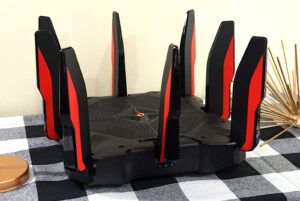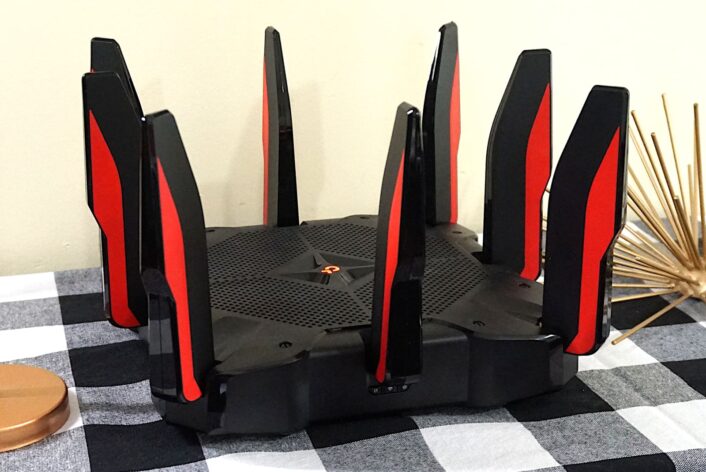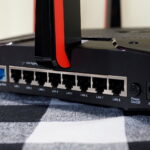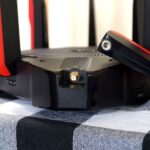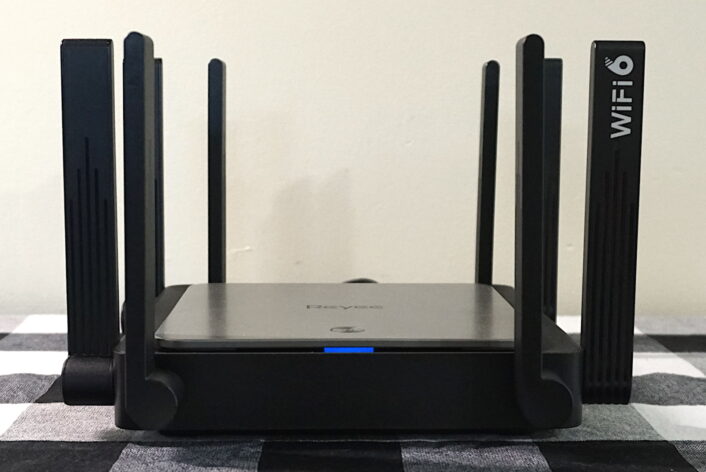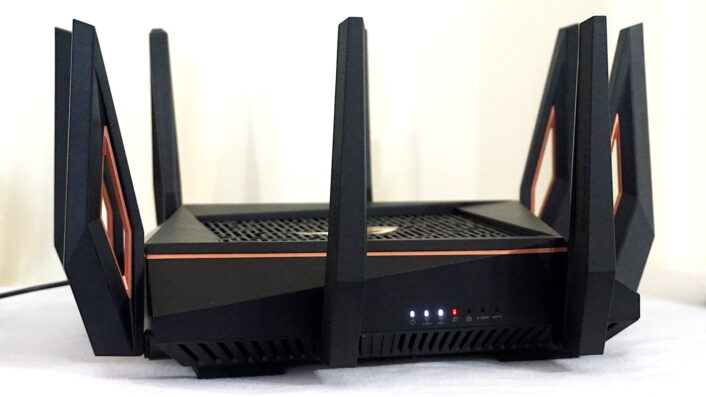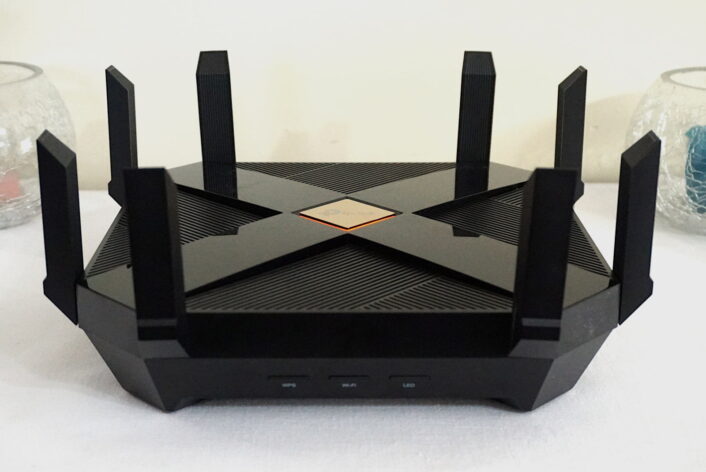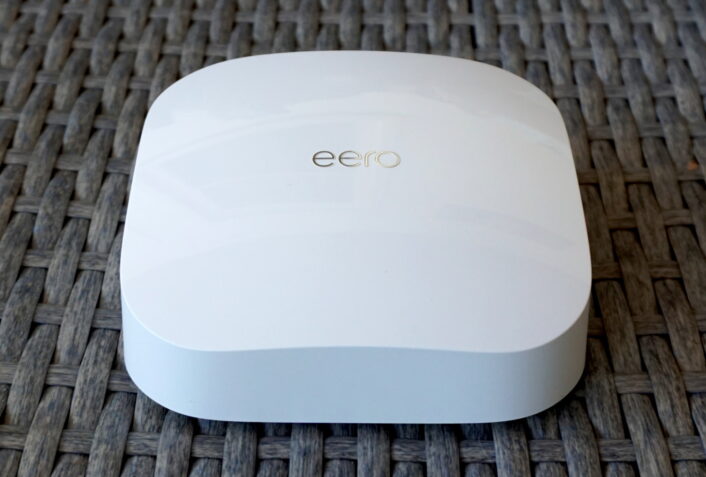Best Routers for AT&T 2026
We tested a batch of routers to see which ones complement to your existing AT&T equipment
Dec 10, 2025 | Share
Best Routers, Brand Guides
-
Best overallTP-Link Archer AX11000
- $229.99*
- Free antivirus
- Ready for Multi-Gig internet
- No real gaming tools
-
Best for budgetsReyee RG-E5
- $89.99*
- Great speeds at long range
- Free cloud management
- No built-in VPN tools
-
Best for gamersASUS ROG Rapture GT-AX11000
- $611.48*
- Multi-Gig internet support
- Free security
- Hefty price tag
*Amazon.com prices (as of 12/10/2025 10:10 MST). Read full disclaimer.
Our pick: Which router for AT&T is best?
AT&T probably wants us to refrain from suggesting routers over its own equipment. In most cases, store-bought routers are an added customer support headache. But if you absolutely need full control over your home network, get TP-Link’s Archer AX11000 standalone router. It works with all plans up to 2 Gbps and includes free features you generally pay more for on competing products
How we test routers
We vigorously test routers to see how well they stack up against the competition in speed and range. We also evaluate the setup process and dig into the web and mobile apps to see if they’re easy or difficult to use. Check out our methodology page for more information.
In this roundup:
Best routers for AT&T | What to look for | Best overall | Our verdict | Benchmarks | FAQ
In this roundup:
The 5 best routers for AT&T
- Best overall: TP-Link Archer AX11000
- Best for budgets: Reyee RG-E5
- Best for gamers: ASUS ROG Rapture GT-AX11000
- Best for 2 Gbps: TP-Link Archer AX6000
- Best for mesh: Amazon Eero Pro 6
Compare router speeds and prices
| Best for | Model | Max throughput | Price* |
|---|---|---|---|
| Overall | TP-Link Archer AX11000 | 11,000Mbps | $229.99 on Amazon |
| Budgets | Reyee RG-E5 | 3,200Mbps | $89.99 on Amazon |
| Gamers | ASUS ROG Rapture GT-AX11000 | 11,000Mbps | $611.48 on Amazon |
| 2Gbps | TP-Link Archer AX6000 | 6,000Mbps | $128.08 on Amazon |
| Mesh | Amazon Eero Pro 6 | 4,200Mbps | $199.99 on Amazon |
* Amazon.com prices (as of 12/10/2025 10:10 MST). Read full disclaimer.
What should you look for in a router for AT&T?
AT&T may already provide the best equipment for your connection, but if you’re dead set on having your own, look for a router with a multi-gig internet port for all plans under 5Gbps. We say this, especially to customers of the 500Mbps plan or slower in case you upgrade to a faster plan later.
You’ll likely want to go with a Wi-Fi 6 router, too. It has faster speeds and better multi-device support over the older Wi-Fi 5 standard. Or better yet, go with a Wi-Fi 6E router if you have devices supporting it, as they can tap into the new 6 GHz band for even more speed.
Do you have the best AT&T plan to go with your router?
If not, enter your zip code below to see what options are available to you.
Best overall—TP-Link Archer AX11000
|
Kevin Parrish | HighSpeedInternet.com |
|
The best multi-gig centerpiece for your network |
|
Score:4out of 5 |
The Archer AX11000 gives you a lot of bang for your buck: free Trend Micro security, loads of wired connectivity, and Wi-Fi 6 speeds. It’s also ideal if you have a multi-gig internet connection. |
| Pros | Cons |
|
|
Price: $229.99*
*Amazon.com price (as of 12/10/2025 10:10 MST). Read full disclaimer.
Expand for product details and ratings
| Category | Score* | Summary |
| Performance | 4 | Competes with the Nighthawk RAX200 in speed but doesn’t have the range. |
| Features | 4 | Includes free antivirus from Trend Micro and easy parental controls. |
| Design | 4 | Provides a 2.5Gbps internet port, plus eight Gigabit Ethernet ports for wired devices. |
| Setup | 4 | Gets your network running quickly, whether you use a browser or the Tether app. |
| Ease of use | 4 | Employs the best interface of all the TP-Link routers we’ve tested. |
* out of 5 points
What we like about it: The Archer AX11000 has good Wi-Fi speeds equal to the ASUS ROG Rapture GT-AX11000 but falls behind NETGEAR’s Nighthawk RAX200 powerhouse—which isn’t surprising at this price. The free Trend Micro security and parental controls are a huge plus if you manage a house full of youngins, as are the eight Ethernet ports. Multi-gig internet? Yes, please!
What we wish it did better: It needs a shorter setup process. Why can’t we name the networks, set the passwords, and move on with life? Plus, for a gaming router, there are no real gaming tools here. Instead, you’ll get redressed settings you typically find on non-gaming routers like port forwarding, parental controls, and data prioritization.
Why do we recommend it? The Archer AX11000 is one of the least expensive gaming routers we’ve tested to date, but there’s nothing cheap about it. It packs several great features into one affordable price. Not a gamer? Doesn’t matter. The Archer AX11000 is ideal for anyone wanting a great router at a great price.
Tested speeds at a glance
| 5 GHz max speed | 2 feet | 40 feet | 120 feet |
| 1,200 | 860 | 692 | 282 |
* Speeds in megabits per second (Mbps) using a Wi-Fi 6 client and an 80 MHz channel. See our Benchmarks section for more speed results from our testing.
| Wi-Fi specs | Wired specs |
|
|
Best for budgets—Reyee RG-E5
|
Kevin Parrish | HighSpeedInternet.com |
|
A business-class router you can use at home |
|
Score:3.8out of 5 |
The Reyee RG-E5 is a business-first router, but it’s also an affordable solution for homes. It has great long-range speeds plus free access to a cloud management platform. |
| Pros | Cons |
|
|
Price: $89.99*
*Amazon.com price (as of 8/19/2024 10:10 MST). Read full disclaimer.
Expand for product details and ratings
| Category | Score* | Summary |
| Performance | 4 | Has the best long-range speeds for under $150. |
| Features | 3 | Provides an ARP Guard and free Ruijie Cloud account. |
| Design | 3 | Lacks USB ports, multi-gig internet support, and VPN tools. |
| Setup | 4 | Has one of the fastest setups we’ve tested to date. |
| Ease of use | 4 | Requires the web and mobile app to use fully. |
* out of 5 points
What we like about it: The RG-E5 has great long-range speeds at this price. Moreover, it has some of the best speed consistencies we’ve seen to date, meaning you don’t see a dramatic speed dropoff as you move away from the router.
What we wish it did better: The RG-E5 is the only Wi-Fi 6 router we have in-house that doesn’t support the latest security standard, WPA3. Plus, it lacks in many other areas like VPN and USB connectivity.
Why do we recommend it? The Reyee RG-E5 is a high-performance router you should get if you’re willing to spend $150. It lacks in some areas, sure, but if consistent speed is what you need across a long range, this is the router for you.
Tested speeds at a glance
| 5 GHz max speed | 2 feet | 40 feet | 120 feet |
| 1,200 | 843 | 636 | 330 |
* Speeds in megabits per second (Mbps) using a Wi-Fi 6 client and an 80 MHz channel. See our Benchmarks section for more speed results from our testing.
| Wi-Fi specs | Wired specs |
|
|
Best for gamers—ASUS ROG Rapture GT-AX11000
|
Kevin Parrish | HighSpeedInternet.com |
|
A full-featured solution anyone should love |
|
Score:4.1out of 5 |
The GT-AX11000 is similar to the Nighthawk RAX200, but you don’t need multiple subscriptions to get the most out of it. However, the tradeoff is a slightly lower Wi-Fi 6 speed based on our tests. |
| Pros | Cons |
|
|
Price: $611.48*
*Amazon.com price (as of 12/10/2025 10:10 MST). Read full disclaimer.
Expand for product details and ratings
| Category | Score* | Summary |
| Performance | 4 | Falls short of the RAX200 in Wi-Fi 6 speed but is one of the fastest we’ve tested. |
| Features | 5 | Includes free antivirus, parental controls, and a built-in VPN server and client. |
| Design | 4 | Supports six wireless devices at full speed; 12 at half speed. |
| Setup | 4 | Takes longer due to all the extras you normally don’t get on a standard router. |
| Ease of use | 4 | Provides a better experience in the web interface than the mobile app. |
* out of 5 points
What we like about it: This router definitely has a lot to love. Its biggest selling point is capacity: three bands and 12 streams. The free antivirus, parental controls, and VPN components also sweeten the deal.
What we wish it did better: We found the antennas problematic—at least on the model we purchased. No matter how hard we screwed the antennas into place, some of them fell over time.
Why do we recommend it? The GT-AX11000 is a great router for gamers—or anyone for that matter. You get free antivirus, decent parental controls, multi-gig internet support, and VPN tools to keep you safe online. It’s ideal for households with lots of devices if you can handle the price.
Tested speeds at a glance
| 5 GHz max speed | 2 feet | 40 feet | 120 feet |
| 1,200 | 848 | 642 | 260 |
* Speeds in megabits per second (Mbps) using a Wi-Fi 6 client and an 80 MHz channel. See our Benchmarks section for more speed results from our testing.
| Wi-Fi specs | Wired specs |
|
|
Best for 2Gbps internet—TP-Link Archer AX6000
|
Kevin Parrish | HighSpeedInternet.com |
|
A fully-featured router at a great price |
|
Score:3.9out of 5 |
The AX6000 is an awesome router for the money, although it lacks the third band and extra streams offered with the Archer AX11000. It has great Wi-Fi speeds, great range, and plenty of wired ports, so you can give your smartphones and tablets more Wi-Fi room to breathe. |
| Pros | Cons |
|
|
Price: $128.08*
*Amazon.com prices (as of 12/10/2025 10:10 MST). Read full disclaimer.
Expand for product details and ratings
| Category | Score* | Summary |
| Performance | 4 | Has some of the fastest Wi-Fi 6 speeds we’ve tested to date, even at long range. |
| Features | 4 | Includes a VPN server, printer sharing, and a free subscription to HomeCare for the life of the router. |
| Design | 4 | Packs a 2.5Gbps WAN port, loads of wired connectivity, and two USB ports. |
| Setup | 3 | Takes longer than it should when compared to the tested setup times on competing routers. |
| Ease of use | 4 | Offers a better experience through the Tether app than the web interface. |
* out of 5 points
What we like about it: Our tests show this router falls behind the Archer AX90 and NETGEAR’s Nighthawk RAX200 powerhouse in speed. Like the Archer AX11000, this router has loads of wired connectivity, a 2.5 Gbps WAN port, and TP-Link’s free HomeCare suite—but it lacks the third Wi-Fi band.
What we wish it did better: At this price, we’re wondering why TP-Link didn’t add a VPN client to complement the built-in server. We also wish the web interface had a dark mode, but that’s true for all TP-Link routers, not this one only.
Why do we recommend it? It’s a great router overall for the money, packing support for 2.5 Gbps internet and loads of Wi-Fi 6 speed—even at a long range. You simply can’t go wrong with this one.
Tested speeds at a glance
| 5 GHz max speed | 2 feet | 40 feet | 120 feet |
| 1,200 | 849 | 605 | 280 |
* Speeds in megabits per second (Mbps) using a Wi-Fi 6 client and an 80 MHz channel. See our Benchmarks section for more speed results from our testing.
| Wi-Fi specs | Wired specs |
|
|
Best for mesh—Amazon Eero Pro 6
|
Kevin Parrish | HighSpeedInternet.com |
|
The best mesh networking kit you can get |
|
Score:3.9out of 5 |
Amazon’s Eero Pro 6 packs a punch, and it’s easy to set up and manage. But the overall price may force you to consider a less expensive, more powerful standalone router. |
| Pros | Cons |
|
|
Price: $199.99*
*Amazon.com prices (as of 8/19/2024 10:10 MST). Read full disclaimer.
Expand for product details and ratings
| Category | Score* | Summary |
| Performance | 4 | Outperforms all other mesh kits we’ve tested to date. |
| Features | 3 | Locks premium security and parental controls behind a subscription. |
| Design | 4 | Includes a third wireless band for better throughput. |
| Setup | 4 | Provides one of the fastest and easiest setups we’ve experienced to date. |
| Ease of use | 4 | Requires the Eero mobile app for quick and easy network management. |
* out of 5 points
What we like about it: The Eero Pro 6 is the fastest mesh kit we’ve tested to date, but it’s more of a wide-range solution than a long one. We love that it includes a fast third Wi-Fi band to help better balance all your devices and optimize traffic flow between all Eero Pro 6 units.
What we wish it did better: Amazon needs to take a cue from Google and incorporate smart speakers into each unit. Including speakers would add voice command support without needing an additional Amazon Alexa-compatible device.
Why do we recommend it? It’s the fastest mesh kit we’ve tested to date, plus it’s easy to set up and manage. It supports Amazon Alexa but is not a smart speaker/networking node combo like the Google Nest Wifi kit.
Tested speeds at a glance
| 5 GHz max speed | 2 feet | 40 feet | 120 feet |
| 1,200 | 802 | 332 | Not tested |
* Speeds in megabits per second (Mbps) using a Wi-Fi 6 client and an 80 MHz channel. See our Benchmarks section for more speed results from our testing.
| Wi-Fi specs | Wired specs |
|
|
Our verdict
The TP-Link Archer AX11000 is a solid choice if you want to add a third-party router to your AT&T equipment. It has great speeds, free security and parental control features, and a Multi-Gig internet port that can handle 2.5Gbps and slower. Plus, it supports TP-Link’s OneMesh technology, so you can add a compatible extender to create a mesh Wi-Fi network—like AT&T’s new system.
Our router benchmarks
Here are the average 5 GHz speeds recorded for each router. Wi-Fi speeds fluctuate significantly, so these numbers reflect at least three tests taken at each 10-foot interval.
TP-Link Archer AX11000
| iPhone 12 Pro Max | Google Pixel 3 | |
|---|---|---|
| 2 feet | 860 | 658 |
| 10 feet | 848 | 645 |
| 20 feet | 768 | 572 |
| 30 feet | 745 | 453 |
| 40 feet (porch) | 692 | 330 |
| 120 feet (across street) | 282 | 175 |
* Speeds in megabits per second (Mbps) using an 80 MHz channel.
Reyee RG-E5
| iPhone 12 Pro Max | Google Pixel 3 | |
|---|---|---|
| 2 feet | 843 | 695 |
| 10 feet | 842 | 692 |
| 20 feet | 789 | 656 |
| 30 feet | 725 | 646 |
| 40 feet (porch) | 636 | 445 |
| 120 feet (across street) | 330 | 143 |
* Speeds in megabits per second (Mbps) using an 80 MHz channel.
ASUS ROG Rapture GT-AX11000
| iPhone 12 Pro Max | Google Pixel 3 | |
|---|---|---|
| 2 feet | 848 | 652 |
| 10 feet | 827 | 644 |
| 20 feet | 755 | 529 |
| 30 feet | 729 | 462 |
| 40 feet (porch) | 642 | 308 |
| 120 feet (across street) | 260 | 169 |
* Speeds in megabits per second (Mbps) using an 80 MHz channel.
TP-Link Archer AX6000
| iPhone 12 Pro Max | Google Pixel 3 | |
|---|---|---|
| 2 feet | 849 | 621 |
| 10 feet | 832 | 576 |
| 20 feet | 782 | 459 |
| 30 feet | 721 | 413 |
| 40 feet (porch) | 605 | 251 |
| 120 feet (across street) | 280 | 123 |
* Speeds in megabits per second (Mbps) using an 80 MHz channel.
Amazon Eero Pro 6
| iPhone 12 Pro Max | Google Pixel 3 | |
|---|---|---|
| 2 feet | 802 | 675 |
| 10 feet | 739 | 641 |
| 20 feet | 690 | 584 |
| 30 feet | 674 | 536 |
| 40 feet (porch) | 332 | 242 |
| 120 feet (across street) | Not tested | Not tested |
* Speeds in megabits per second (Mbps) using an 80 MHz channel.
FAQ about routers for AT&T
Why don’t you list routers with 5Gbps support?
Do I need to enable IP Passthrough?
What is OneMesh?
Disclaimer
Amazon.com Prices as of 8/19/24 10:10 MST. Product prices and availability are accurate as of the date/time indicated and are subject to change. Any price and availability information displayed on Amazon.com at the time of purchase will apply to the purchase of this product. Highspeedinternet.com utilizes paid Amazon links.
CERTAIN CONTENT THAT APPEARS ON THIS SITE COMES FROM AMAZON. THIS CONTENT IS PROVIDED ‘AS IS’ AND IS SUBJECT TO CHANGE OR REMOVAL AT ANY TIME.
Author - Kevin Parrish
Kevin Parrish has more than a decade of experience working as a writer, editor, and product tester. He began writing about computer hardware and soon branched out to other devices and services such as networking equipment, phones and tablets, game consoles, and other internet-connected devices. His work has appeared in Tom’s Hardware, Tom's Guide, Maximum PC, Digital Trends, Android Authority, How-To Geek, Lifewire, and others. At HighSpeedInternet.com, he focuses on network equipment testing and review.
Editor - Rebecca Lee Armstrong
Rebecca Lee Armstrong has more than six years of experience writing about tech and the internet, with a specialty in hands-on testing. She started writing tech product and service reviews while finishing her BFA in creative writing at the University of Evansville and has found her niche writing about home networking, routers, and internet access at HighSpeedInternet.com. Her work has also been featured on Top Ten Reviews, MacSources, Windows Central, Android Central, Best Company, TechnoFAQ, and iMore.
